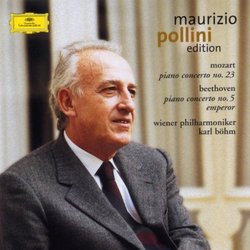| All Artists: Ludwig van Beethoven, Wolfgang Amadeus Mozart, Karl Böhm, Vienna Philharmonic Orchestra, Maurizio Pollini Title: Mozart: Piano Concerto No. 23; Beethoven: Piano Concerto No. 5 Members Wishing: 0 Total Copies: 0 Label: Deutsche Grammophon Release Date: 2/11/2003 Genre: Classical Styles: Forms & Genres, Concertos, Historical Periods, Classical (c.1770-1830), Instruments, Keyboard, Symphonies Number of Discs: 1 SwapaCD Credits: 1 UPC: 028947135128 |
Search - Ludwig van Beethoven, Wolfgang Amadeus Mozart, Karl Böhm :: Mozart: Piano Concerto No. 23; Beethoven: Piano Concerto No. 5
 | Ludwig van Beethoven, Wolfgang Amadeus Mozart, Karl Böhm Mozart: Piano Concerto No. 23; Beethoven: Piano Concerto No. 5 Genre: Classical |
Larger Image |
CD Details |
CD ReviewsMagic R W Tindle | Kent England | 11/22/2003 (5 out of 5 stars) "For me, Pollini is the definitive interpreter of Mozart and nowhere more so than in this recording of the Mozart 23. His reading of the slow movement is sublime with moments of heart-stopping beauty. I have several interpretations of all of Mozart's piano concertos but Pollini's are the only ones that consistently deliver. It is as though he has had a master-class from WAM." Simply pleasure R W Tindle | 10/20/2003 (5 out of 5 stars) "It is simply pleasure to listen to it. Pollini's playing sounds crystal clear with his brilliant virtuosity, and yet never loose the sight of music itself. His Mozart is touching and warm, and Beethoven is full of sheer brilliance. Beautiful!" Excellent Mozart; Disappointing Beethoven J. Leitch | Baltimore, MD, United States | 02/05/2005 (3 out of 5 stars) "I absolutely loved the Mozart, and I think Pollini should record more of him, but I bought this mainly for the Beethoven "Emperor" Concerto. His edition with Claudio Abbado is out of print, it seems, and this was(a reissue of) the only other recording he's made of the Beethoven Concerto that I am aware of.
The piano is UNFORGIVABLY LOUD in the Beethoven. The performance is exactly what I wanted(even better than the legendary Fleisher cycle on Sony Classical), otherwise, but the piano is so loud in parts that one cannot hear what the orchestra's doing. I am a huge fan of Pollini, and few can approach his mastery of all things Beethoven, but I just want to violently SHAKE the person that ruined this recording by mixing the piano in so loudly." |
